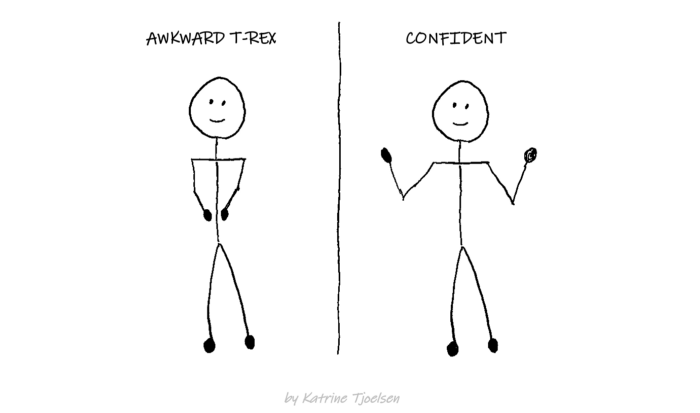8 Communication Hacks I Use To Appear More Senior As a Young Employee by
Become more influential by learning the language of these subtle cues มีอิทธิพลมากขึ้นด้วยการเรียนรู้ภาษาของสัญลักษณ์ที่ละเอียดอ่อนเหล่านี้

Hate it when you are not taken seriously?
When I started working as a 24-year-old woman, I struggled. How to command attention? How not to be dismissed for my size, gender, and lack of wrinkles or gray hair?
I’ve learned hacks to appear more senior. To be more influential. Within two years as a product manager, I was promoted to lead a team of product managers. And I’m now an MBA student at the Stanford Graduate School of Business.
These communication hacks can also help you appear more senior and be more influential. การแฮ็กการสื่อสารเหล่านี้สามารถช่วยให้คุณดูเป็นผู้อาวุโสและมีอิทธิพลมากขึ้น
1. Speak slower than what feels natural พูดให้ช้าลงกว่าที่รู้สึกว่าเป็นธรรมชาติ
When we speak fast, it’s as if we’re worried we’ll get interrupted otherwise. เมื่อเราพูดเร็ว เหมือนกับว่าเรากังวลว่าจะถูกขัดจังหวะ
I rush when I worry my thoughts aren’t worth listening to. But how do we slow down… in practice? Speech coach Jamie Chapman says that telling ourselves to speak slowly zaps the energy out of our speech. การบอกตัวเองให้พูดช้าๆ นั้นบั่นทอนพลังในการพูดของเรา
Instead, Chapman suggests:
(a) emphasizing select words, เน้นคำที่เลือก and
(b) deliberately pausing. จงใจหยุดชั่วคราว
2. Interrupted? Then interrupt the interrupter ขัดจังหวะ? จากนั้นขัดจังหวะผู้ขัดขวาง
Did someone jump in and take the word from you, while you were talking? มีคนกระโดดเข้ามารับคำพูดของคุณในขณะที่คุณกำลังพูดอยู่หรือเปล่า?
Don’t just let it happen. Reclaim the word: “May I finish?” No need to wait for a pause. Interrupt the interrupter. I first tried this in a role play in the Stanford MBA class Leadership Laboratory. It blew my mind how quickly it established my influence. อย่าเพิ่งปล่อยให้มันเกิดขึ้น เรียกคืนคำว่า: "ฉันขอจบได้ไหม" ไม่ต้องรอหยุดชั่วคราว รบกวนผู้ขัดขวาง ฉันได้ลองสวมบทบาทนี้เป็นครั้งแรกในห้องปฏิบัติการภาวะผู้นำระดับ MBA ของสแตนฟอร์ด มันทำให้ฉันรู้สึกทึ่งว่ามันสร้างอิทธิพลให้ฉันได้เร็วแค่ไหน
Next time, try “May I finish?” If that’s not enough, try these other tips from Wendy R.S. O’Connor. ครั้งหน้า ลอง “ฉันขอจบได้ไหม” หากยังไม่พอ ลองเคล็ดลับอื่นๆ เหล่านี้จาก Wendy R.S. โอคอนเนอร์
3. Explain the bigger picture อธิบายภาพใหญ่
What’s obvious to you, often isn’t to others. สิ่งที่ชัดเจนสำหรับคุณ มักจะไม่ใช่สำหรับคนอื่น
By explaining the bigger picture, you help others see it too. And if you’re speaking to someone senior who already knows it, you help them see where your work fit in. คุณช่วยให้ผู้อื่นเห็นภาพรวมด้วยการอธิบายภาพรวม และถ้าคุณกำลังพูดคุยกับผู้อาวุโสที่รู้เรื่องนี้อยู่แล้ว คุณจะช่วยให้พวกเขาเห็นว่างานของคุณเหมาะสมกับตำแหน่งใด
4. Avoid making statements sound like questions หลีกเลี่ยงการทำให้ประโยคดูเหมือนเป็นคำถาม
“Your statement lost its effect when you ended it on a high pitch,” a group member told me. Upspeak, it’s called. I do it when I feel uncertain. “คำพูดของคุณไม่มีผลเมื่อคุณจบด้วยระดับเสียงสูง” สมาชิกในกลุ่มคนหนึ่งบอกฉัน Upspeak เรียกว่า ฉันทำเมื่อรู้สึกไม่มั่นใจ
But upspeak loses credibility and influence. And it’s unnecessary. If it’s important to convey our uncertainty, we can use words like “I think.” We can even pose a question formulated grammatically as a question should be. แต่การพูดเกินจริงจะสูญเสียความน่าเชื่อถือและอิทธิพล และไม่จำเป็น หากการสื่อถึงความไม่แน่นอนเป็นสิ่งสำคัญ เราสามารถใช้คำอย่างเช่น “ฉันคิดว่า” เรายังสามารถตั้งคำถามตามไวยากรณ์ตามที่ควรจะเป็น
Caveat: Someone else’s upspeak is no excuse to be dismissive. As leaders and colleagues, we should strive to hear what our colleagues have to say even if they use this speech pattern.
ข้อแม้: การพูดลอยๆ ของคนอื่นไม่ใช่ข้อแก้ตัวที่จะเพิกเฉย ในฐานะผู้นำและเพื่อนร่วมงาน เราควรพยายามฟังสิ่งที่เพื่อนร่วมงานพูดแม้ว่าพวกเขาจะใช้รูปแบบคำพูดนี้ก็ตาม
Give your statements the punch they deserve. ให้คำพูดของคุณตรงกับที่พวกเขาสมควรได้รับ
5. Provide structure with signposts จัดทำโครงสร้างป้ายบอกทาง
Using signposts — that is, terms that provide structure and transitions — is a hack that instantly improves clarity. การใช้ป้ายบอกทาง — นั่นคือคำศัพท์ที่ให้โครงสร้างและช่วงการเปลี่ยนภาพ — เป็นแฮ็คที่ปรับปรุงความชัดเจนในทันที
Communication coach Alexander Lyon describes how to use “first,” “second,” and “third” to indicate shifts between our main points. อธิบายวิธีใช้ "ที่หนึ่ง" "ที่สอง" และ "ที่สาม" เพื่อระบุการเปลี่ยนแปลงระหว่างประเด็นหลักของเรา
He also explains classic transitions and what he calls summary transitions, to help the listener when you shift from one topic to the next. ขายังอธิบายการเปลี่ยนผ่านแบบคลาสสิกและสิ่งที่เขาเรียกว่าการเปลี่ยนผ่านโดยสรุป เพื่อช่วยผู้ฟังเมื่อคุณเปลี่ยนจากหัวข้อหนึ่งไปยังอีกหัวข้อหนึ่ง
Signposts give clarity. And clarity is influential. ป้ายบอกทางให้ความชัดเจน และความชัดเจนมีอิทธิพล

6. Cut the fluff in emails ตัดปัญหาในอีเมล
“Fine. When will the report be ready? — Jeff.”
Ever noticed how senior leaders can write such short, direct emails? I tend to embellish my message with “dear,” “hope you’re well,” “kind regards,” and other fluffy formalities. เคยสังเกตไหมว่าผู้นำระดับสูงสามารถเขียนอีเมลที่สั้นและตรงประเด็นได้อย่างไร ฉันมักจะตกแต่งข้อความของฉันด้วยคำว่า "ที่รัก" "หวังว่าคุณจะสบายดี" "ขอแสดงความนับถือ" และพิธีการที่นุ่มนวลอื่นๆ
The formalities are (often) not needed. พิธีการไม่จำเป็น (มัก)
7. Replace exclamation marks with periods แทนที่เครื่องหมายอัศเจรีย์ด้วยจุด
See how junior an email saturated with exclamation marks looks :
ดูว่าอีเมลที่มีเครื่องหมายอัศเจรีย์เต็มแล้วมีลักษณะอย่างไร:
Hi, all!
Hope you’re as excited as I am for tomorrow! We’re celebrating our accomplishments with cake! Join us tomorrow at 2 pm!
See you soon!
And why the exclamation marks? Why not simply:
Hi, all.
Hope you’re as excited as I am for tomorrow. We’re celebrating our accomplishments with cake. Join us tomorrow at 2 pm.
See you soon.
8. Take physical space ใช้พื้นที่ทางกายภาพ
“Playing high (…) will look like a very open, expansive, relaxed body,” says Deborah Gruenfield, a Stanford professor and author of Acting with Power. “การเล่นให้สูง (…) จะดูเหมือนร่างกายที่เปิดกว้าง กว้างขวาง และผ่อนคลาย” เดโบราห์ กรูนฟิลด์ ศาสตราจารย์จากมหาวิทยาลัยสแตนฟอร์ดและผู้เขียนหนังสือเรื่อง Acting with Power กล่าว
Often find yourself with crossed legs, or bent over looking small? Open up your posture. Take up more physical space. มักจะพบว่าตัวเองไขว่ห้างหรือก้มตัวจนดูตัวเล็ก? เปิดท่าทางของคุณ ใช้พื้นที่ทางกายภาพมากขึ้น

Enjoyed this?
ตัดแปะโดย เฉลิมชัย เอื้อวิริยะวิทย์
ไม่มีความคิดเห็น:
แสดงความคิดเห็น